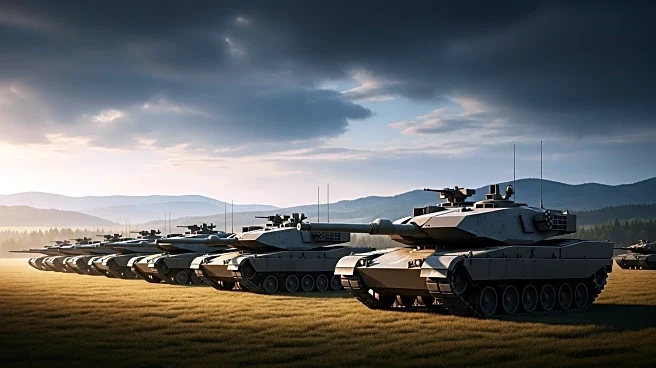What is the story about?
What's Happening?
Russia and Belarus have commenced the Zapad-2025 military exercises near NATO's borders, prompting Poland to close its border with Belarus. The drills, which simulate repelling an attack, have raised concerns in Europe, especially following recent drone incursions into Polish airspace. Poland has deployed 40,000 troops along its borders with Belarus and the Russian Kaliningrad exclave. The exercises are seen as a demonstration of military strength by Russia and Belarus, with claims of hosting Russian tactical nuclear arms in Belarus. The drills are being closely monitored by NATO and neighboring countries, given the historical context of previous Zapad exercises preceding Russia's invasion of Ukraine.
Why It's Important?
The Zapad-2025 military exercises highlight the ongoing tensions between Russia and NATO member states, particularly in Eastern Europe. The drills serve as a reminder of the strategic importance of the region and the potential for military escalation. Poland's decision to close its border and deploy troops underscores the perceived threat posed by the exercises. The situation may influence NATO's defense strategies and prompt further military preparedness among member states. The presence of Russian tactical nuclear weapons in Belarus adds a layer of complexity to the geopolitical dynamics, potentially affecting regional security and diplomatic relations.
What's Next?
As the Zapad-2025 exercises continue, NATO and European countries are likely to maintain heightened vigilance and readiness. The drills may lead to increased military cooperation among NATO allies and further defensive measures along borders with Russia and Belarus. Diplomatic efforts to address the tensions may be pursued, with potential discussions on arms control and regional security. The international community will be watching closely for any signs of escalation or changes in military posturing by Russia and Belarus.
Beyond the Headlines
The military exercises raise questions about the long-term implications for regional security and the balance of power in Eastern Europe. The involvement of nuclear weapons in the drills may prompt discussions on nuclear non-proliferation and the risks associated with their deployment. The situation also highlights the challenges faced by countries in the region in navigating their relationships with both Russia and NATO, as well as the broader impact on global security dynamics.














